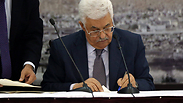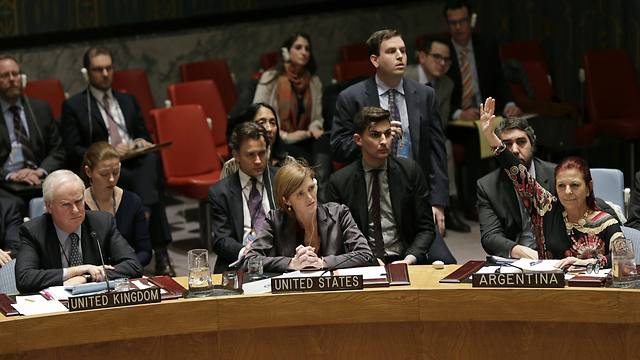
Palestinian President Mahmoud Abbas. An equation which does not benefit Israel
צילום: EPA
Palestinians lost the diplomatic battle, not the war
Op-ed: While the rejection of the Palestinian appeal to the Security Council does contain a diplomatic achievement for Israel, isn't it just a case of delaying the inevitable?
There are about 196 states in the world. There is a high probability that all of them, apart from Israel, accept the wording of the United Nations Security Council's resolution to outline a framework for a negotiated solution to the Israeli-Palestinian conflict.
While the rejection of the Palestinian appeal to the Security Council this week does contain a diplomatic achievement, the question is where is it leading – and isn't it just a case of delaying the inevitable?
As long as there is no peace process with real intentions – or as long as, as Foreign Minister Avigdor Lieberman repeatedly says, Israel fails to initiate but is only gets dragged – Israel is simply engaging in a rearguard battle against a tired and grumbling world which is losing interest and patience.
The Security Council's decision to reject the proposal bears some good, but temporary, news for Israel. However, it also bears bad news, which increase Israel's isolation and the impatience towards the Netanyahu government's stance.
The good news is that the resolution was rejected without the US having to use its veto. Only eight countries voted in favor of the proposal, while a majority of nine out of 15 is required for a "moral majority." In such a scenario, the US would have vetoed the decision.
The claim that the Palestinians are reckless and missed an opportunity, because five of the Security Council's 10 non-permanent members will be replaced in early January (and three of them – Malaysia, Venezuela and Angola – would have voted in favor of the resolution), is irrelevant.
In light of the expected American veto and according to the Palestinian pattern of behavior in the international arena – being perceived as weak victims who need the world's support for their distress – the Palestinians lost this diplomatic battle, but not the war.
Mahmoud Abbas' attempt to turn the peace process into an international issue strengthens the equation that the Palestinians want a state without negotiations and Israel wants negotiations which will not lead to a Palestinian state.
Such an equation, in the eyes of the global public opinion and among diplomats and decision makers, does not benefit Israel, which is perceived as strong and as an occupier.
There is more good news: Nigeria's decision to abstain. Its president, Goodluck Jonathan, is an Evangelical Christian. His wife's name, by the way, is Patience, and it’s quite possible that Israel's diplomatic good luck will not last in the face of the Palestinian patience.
With the United States, it's a more complicated issue. On the surface, it seems that President Barack Obama and Secretary of State John Kerry's persuasion attempts tipped the scales against the French-Palestinian proposal.
Even if the US had imposed a veto, it would have been a sour and bitter veto motivated by the elections in Israel rather than by a decision based on the American stance and principles.
Evidence can be found in the Obama administration's explanation of the decision, in which the US reiterated the formula of the 1967 lines with border corrections. This is something Netanyahu confronted and quarreled about with Obama in the past for no reason and in vain.
So there was a diplomatic achievement, thanks to the US and Nigeria. But whoever fails to initiate may not see any other achievements.
Alon Pinkas served as Israel's consul-general in New York.











